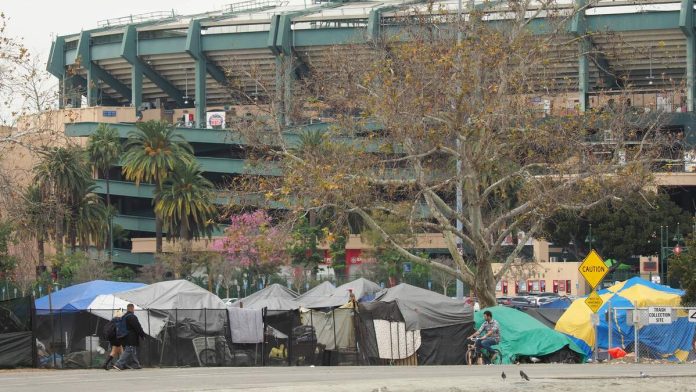The Orange County Board of Supervisors approved a new policy on Tuesday that allows for the immediate arrest and fining of unhoused individuals camping on county-owned land, including flood control channels and parks. The policy passed with a 4-1 vote, despite concerns about the potential impact on Santa Ana, which may see an increase in unhoused people being booked and released from the county jail.
This decision marks a significant shift in how Orange County addresses homelessness, following a Supreme Court ruling in City of Grants Pass v. Johnson. The ruling reversed a previous ban on criminalizing people for sleeping in public spaces if no adequate shelter was available. The new policy also reverses parts of a 2019 legal settlement that required the county to offer shelter and services before arresting individuals for camping violations.
Supervisor Katrina Foley, who proposed the measure, emphasized that the new ordinance is not intended to “arrest our way out of this” but to ensure public safety by enforcing anti-camping rules. The policy aims to create uniform rules across different jurisdictions to prevent encampments from re-emerging in areas like the Santa Ana River and Talbert Regional Park.
Supervisor Vicente Sarmiento was the sole dissenting vote, expressing concerns about the policy’s departure from previous efforts to get people into shelters and the potential burden on Santa Ana’s resources. He noted past issues with individuals being released from jail without transportation, leading to an increase in homelessness in Santa Ana.
Despite the new policy, Orange County officials plan to continue sending social workers with sheriff’s deputies to offer assistance to those camping on county property. However, the county still faces challenges, as homelessness has grown by 28% between 2022 and 2024, and there remains a shortage of affordable housing.
The Supreme Court’s decision in Grants Pass v. Johnson has influenced similar policies across California and the West, as local governments seek to balance public safety with the rights of unhoused individuals. The ruling allows municipalities to enforce camping bans, provided the punishments are not deemed “cruel and unusual” under the Eighth Amendment.

Recent Comments